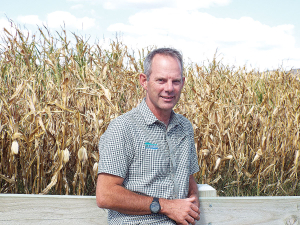Early drought fears ease in Hawke’s Bay, but caution remains
Fears of a serious early drought in Hawke’s Bay have been allayed – for the moment at least.
 AgFirst chief executive James Allen says if the drought is bad, there may be a shortage of feed nationwide and it will be hard and costly to buy-in feed.
AgFirst chief executive James Allen says if the drought is bad, there may be a shortage of feed nationwide and it will be hard and costly to buy-in feed.
A warning to dairy farmers: don’t try to buy yourself out of any drought.
That’s the message from AgFirst chief executive and dairy specialist James Allen in light of warnings from Niwa that El Nino conditions could cause a significant drought in many parts of the country. Already there have been signs of the El Nino conditions hitting Hawke’s Bay and Tairawhiti regions with higher-thanaverage temperatures.
Allen told Dairy News that dairying areas most at risk are Northland, the Waikato – especially northern parts of the region – and possibly Bay of Plenty. He says he’s been told by colleagues further south that Manawatū may also get hit by a drought as they have in the past.
“But certainly, the further north you go, the more I get worried,” he says.
He says many regions went into winter with good levels of supplement and says they were needed. He says now one of the key things farmers need to do is to take stock of what they have got left and start building up reserves again.
Allen says the options will vary from region to region and from farm to farm, with some opting for crops while others will focus on producing as much grass silage as they can for the season ahead.
“But equally it’s important to keep the budget in mind as well, especially given the projected lower payout, and farmers need to be clear on what action is profitable and what is not. The dynamics are much different to… two or three years ago. In past drought years, farmers have tended to hold on to poor performing animals longer, but this year getting stock off early will take the pressure off the farm,” he says.
Allen says in this regard it’s important that farmers communicate frequently and well with their processors and book stock in early. He says it’s no longer possible to ring up a company one night and expect the animals to be picked up the next day.
“This doesn’t happen anymore,” he says.
Planning is therefore critical and Allen says it’s often better getting the cull cows off early to reduce the amount of feed that might have to bought in. And on this subject, Allen says that if the drought is bad, there may be a shortage of feed nationwide and it will hard and costly to buy-in feed.
“I certainly wouldn’t be budgeting on sourcing feed from the South Island,” he says.
Allen reiterates that, given the low commodity prices, the prospect of buying oneself out of the drought is fraught.
A New Zealand-first native tree study has highlighted the Bioeconomy Science Institute's position as a forestry research leader.
Hemp fibre processor Rubisco is relocating its core processing facility to Ashburton as part of a $20-$30 million expansion to leverage what it says is an accelerating global demand for sustainable and renewable fibres.
Tradition meets some of the latest in technology at the 2026 East Coast Farming Expo.
OPINION: Trade Minister Todd McClay and the trade negotiator in government have presented Kiwis with an amazing gift for 2026 - a long awaited and critical free trade deal with India.
Former Agriculture Minister Nathan Guy says he's excited about his new role as NZ's Special Agricultural Trade Envoy.
A pillar of New Zealand's horticultural industry, Dr Stuart Davis, was farewelled at a well-attended funeral service in Tuakau, South Auckland, on December 18.
President Donald Trump’s decision to impose tariffs on imports into the US is doing good things for global trade, according…
Seen a giant cheese roll rolling along Southland’s roads?